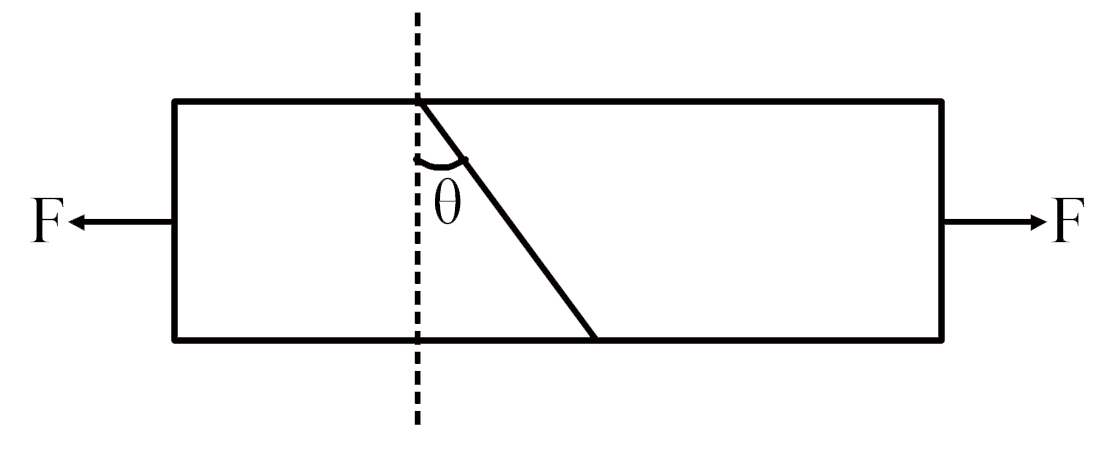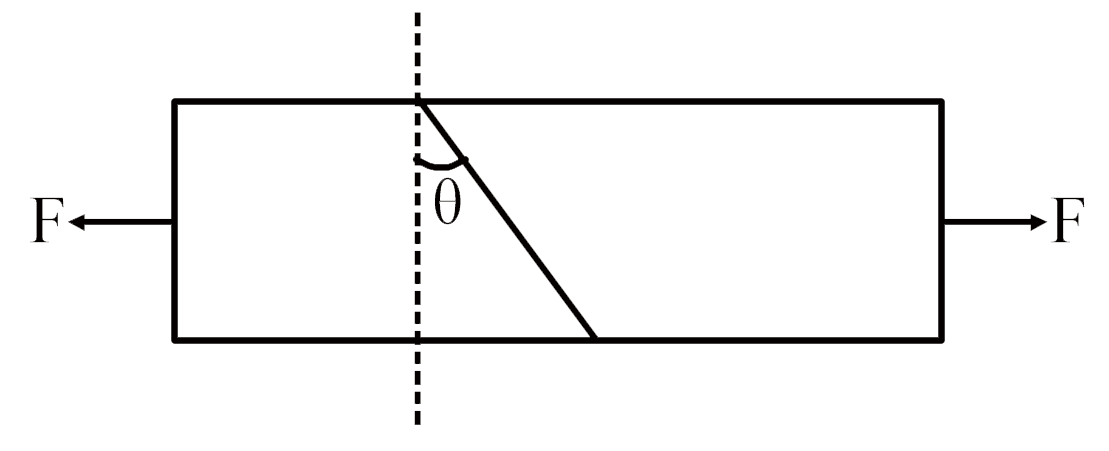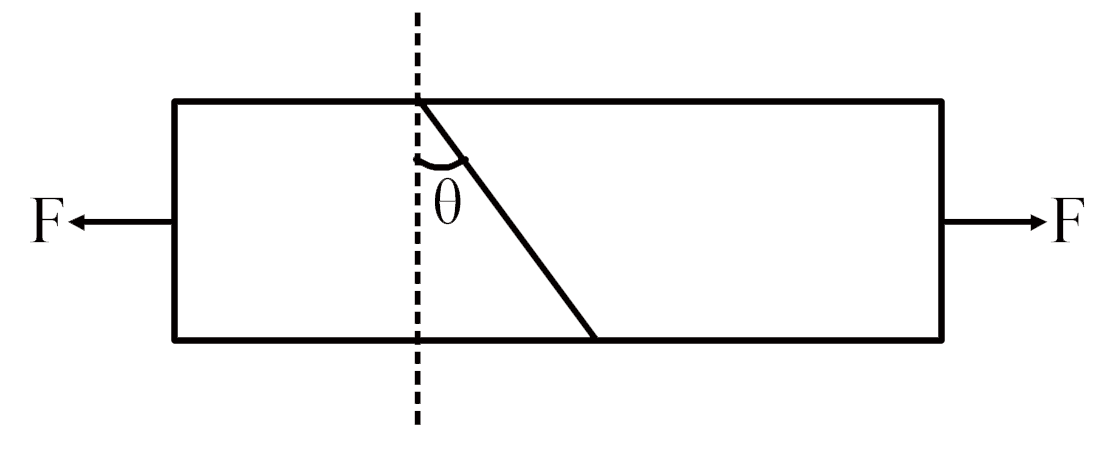Complete Solutions to Physics of chapter MECHANICAL PROPERTIES OF FLUIDS of Class 12 book with complete answers and questions
| Class 12 | PHYSICS |
| Chapter | MECHANICAL PROPERTIES OF FLUIDS |
| DISHA | Physics |
| Number Of Questions | 28 |
| Academic Year | 2023-24 |
Length of a wire is doubled, when `20 xx 10^(8) N//m^(2)` stress is applied on it. Its Young’s modulus of elasticity in N/m2 will be
View SolutionA steel wire of uniform cross-sectional area `2mm^(2)` is heated upto `50^(@)` and clamped rigidly at two ends . If the temperature of wire falls to `30^(@)` then change in tension in the wire will be , if coefficient of linear expansion of steel is `1.1 xx 10^(-5)//"^(@)C` and young's modulus of elasticity of steel is `2 xx 10^(11) N//m^(2)`
View SolutionThe workdone in increasing the length of a one metre long wire of cross `-` sectional area `1 m m^(2)` through `1mm` will be `(Y=2xx10^(11)Nm^(-2)) :`
View SolutionA spring is stretched by 3cm when a load of `5.4 × 10^(6)` dyne is suspended from it. Work done will be-
View SolutionA wire of length 1m and area of cross section `4 xx 10^(-8) m^(2)` increases in length by 0.2 cm when a force of 16 N is applied. Value of Y for the material of the wire will be
View SolutionThe volume of a solid rubber ball when it is carried from the surface to the bottom of a 200 m deep lake decreases by `0.1%`. The value for bulk modulus of elasticity for rubber will be
View SolutionA steel wire is 4.0 m long and 2 mm in diameter. Young’s modulus of steel is `1.96 xx 10^(11) N//m^(2)`. If a mass of 20 kg is suspended from it the elongation produced will be-
View SolutionA brass rod is to support a load of 400 N. If its elastic limit is `4.0 xx 10^(8) N//m^(2)` its minimum diameter must be -
View SolutionA 4.0 m long copper wire of cross sectional area `1.2 cm^(2)` is stretched by a force of `4.8 × 10^(3)` N stress will be -
View SolutionA copper rod 2m long is stretched by 1mm. Strain will be -
View SolutionA wire of cross sectional area `3mm^(2)` is just stretched between two fixed points at a temperature of `20^(@)` . Determine the tension when the temperature falls to `20^(@)`C . Coefficient of linear of expansion `alpha = 10^(-5)//"^(@)C` and Y = ` 2 xx 10^(11)N//m^(2)`.
View SolutionThe compressibility of water is `5 xx 10^(-10) m^(2)//N` . If it is subjected to a pressure of 15 MPa, the fractional decrease in volume will be-
View SolutionThe Young’s modulus of steel is `2 × 10^(11) N//m^(2)` and its coefficient of linear expansion is `1.1 × 10^(–5)` per deg. The pressure to be applied to the ends of a steel cylinder to keep its length constant on raising its temperature by `100^(@)C`, will be -
View SolutionFor a given material the Young's modulus is `2.4` times that of its rigidity modulus. Its Poisson's ratio is
View SolutionA wire of length 1m is stretched by a force of 10N. The area of cross-section of the wire is `2 × 10^(–6) m^(2)` and Y is ` 2 xx 10^(11) N//m^(2)` . Increase in length of the wire will be -
View SolutionA stress of `1kg//mm^(2)` is applied on a wire. If the modulus of elasticity of the wire is `10^(10) "dyne"//cm^(2)`, then the percentage increase in the length of the wire will be
View SolutionA metallic wire is suspended by suspending weight to it. If S is longitudinal strain and Y its young's modulus of elasticity then potential energy per unit volume will be
View SolutionThe lengths and radii of two wires of same material are respectively L, 2L, and 2R, R. Equal weights are applied on then. If the elongations produced in them are `l_(1)` and `l_(2)` respectively then their ratio will be
View SolutionThe ratio of radii of two wires of same material is `2 : 1`. If these wires are stretched by equal forces, then the ratio of stresses produced in them will be
View SolutionA rod of length l and area of cross-section A is heated from `0^(@)C` to `100^(@)C`. The rod is so placed that it is not allowed to increase in length, then the force developed is proportional to
View SolutionWhich statements are false for a metal?
(1) `Y lt eta`
(2) `Y = eta`
(3) `Y lt 1//eta`
(4) ` Y gt eta`
View SolutionWhich of the following relations are false
(1) `3Y = K(1 - sigma)`
(2) `sigma = (6K + eta) Y`
(3) `K = (9etaK)/(Y + eta)`
(4) `sigma = (0.5 Y - eta)/(eta)`
View SolutionA bar of cross section A is subjected to equal and opposite tensile forces F at its ends. Consider a plane through the bar making an angle `theta` with a plane at right angles to the bar as shown in figure.

The tensile stress at this plane in terms of F, A and `theta` is
View SolutionA bar of cross section A is subjected to equal and opposite tensile forces F at its ends. Consider a plane through the bar making an angle `theta` with a plane at right angles to the bar as shown in figure.

In the above problem, for what value of `theta` is the tensile stress maximum ?
View SolutionA bar of cross section A is subjected to equal and opposite tensile forces F at its ends. Consider a plane through the bar making an angle `theta` with a plane at right angles to the bar as shown in figure.

The shearing stress at the plane, in terms of F, A and `theta` is
View SolutionStatement -1 : Steel is more elastic than rubber.
Statement -2 : Under given deforming force, steel is deformed less than rubber.
View SolutionStatement -1 : Bulk modulus of elasticity (K) represents incompressibility of the material.
Statement -2 : Bulk modulus of elasticity is proportional to change in pressure.
View SolutionIn the following questions, a statement of assertion is followed by a statement of reason. Mark the correct choice as
(a) If both assertion and reason are true and reason is the correct explanation of assertion.
(b) If both assertion and reason are true but reason is not the correct explanation of assertion.
(c ) If assertion is true but reason is false.
(d) If assertion and reason are false.
Q. Assertion: The bridges are declared unsafe after long use.
Reason: Elastic strength of bridges losed with time.
View Solution
Physics questions and complete solutions for chapter MECHANICAL PROPERTIES OF FLUIDS of DISHA PHYSICS (HINGLISH) of Class 12